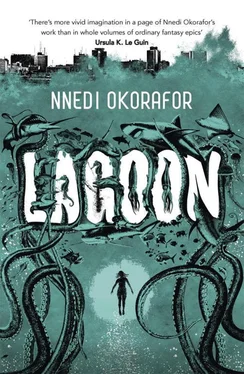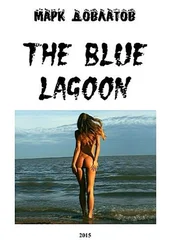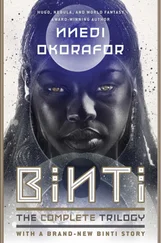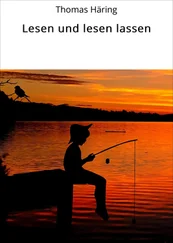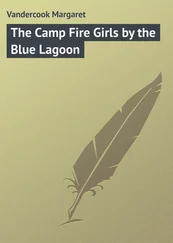Adaora turned to the water as the breeze blew in her face. She inhaled. The air smelled as it always smelled, fishy and salty with a hint of smoke from the city. But the water was way too high. Nearly ten feet up the beach! Only a foot from her toes. In the darkness, bar and restaurant owners and employees with battery-powered torches looked fearfully at the water as they rushed about closing up. All their customers must have fled. They should be more than a little afraid , Adaora thought, shutting her eyes and trying to gather her faculties. How much time has passed? Hours? A few minutes?
“What’s done is done,” the woman said. “We are here. Now…”
“Now you… you people should leave,” Adaora said, slurring her words.
“No. We stay.”
Adaora looked at the woman and couldn’t bring herself to feel irritated. She shut her eyes again, forcing herself to think analytically, calmly, rationally, like the scientist she was. Many things depended on how she reacted, she knew. But when she looked at the woman, an unscientific thought occurred to her.
There was something both attractive and repellent about the woman, and it addled Adaora’s senses. Her hair was long; her many braids perfect and shiny, yet clearly her own hair. She had piercing brown eyes that gave Adaora the same creepy feeling as when she looked at a large black spider. Her mannerisms were too calm, fluid and… alien. Adaora’s husband Chris would instantly hate this woman for all of these reasons. To him, this woman would be a “marine witch”. Her husband believed there were white witches, physical witches and marine witches. All were evil, but the marine witch was the most powerful because she could harness water, the very substance that made up 70 per cent of an adult’s body and 75 per cent of a child’s. Water is life , she thought, yet again.
Adaora grinned. She could easily pass the woman off as her cousin. Scaring the shit out of her husband was the perfect way to get back at him. And she had a lab in the basement. She could run some simple tests on this… “woman” there. It would be an easy, uncomplicated, private way to determine if what was happening was real and not just some stress-fueled bizarre hallucination.
“What should I call you?” Adaora asked, sighing and rubbing her forehead. She touched her cheek. Still swollen and sore.
The woman paused and then smiled knowingly. “I like the name Miri?”
Adaora blinked, surprised. She’d been thinking this exact name. It really could read her mind. The name “Miri” would surely drive her husband that much more insane; it would be the icing on the cake. Still, something in Adaora resisted. The name needed to be more subtle than the Igbo word for “water”.
“No,” Adaora said. “What of the name…” She paused as the name “Ayodele” came to mind. It was a Yoruba name and it would fill Chris with suspicion, since Adaora was Igbo. Also, Adaora had had a childhood friend named Ayodele who’d been killed while trying to cross a busy street when she was eight years old. She’d loved Ayodele. She frowned at the woman. “Do you know what name I’m thinking of right now?”
It… she smiled. “No.”
Adaora’s husband would remember her friend Ayodele from when they were kids, too. He’d cried just as much as Adaora when it happened. The name would trouble him more than “Miri”. Yes.
“You need a place to stay,” Adaora said.
“Yes,” she said. “I would like that.”
“Fine,” Adaora said, her voice hardening. “So you are Ayodele, then.”
Chapter 4
What Would You Do?
They all went. Adaora, Anthony, Ayodele and Agu… Adaora knew the soldier’s name now. She knew plenty about both Anthony and Agu, and they knew plenty about her. Adaora drove.
What would you do if this happened to you?
The soldier Agu had woken soon after Adaora had given the creature a name. His still swollen face was crusty with sea salt and blood that must have seeped from his wounds and dried after they’d been returned. All he could think about was his family who he said was in the village. “Please, do you have a mobile phone?” he’d asked Adaora again.
“It’s in my car,” she said. “Let’s wake Anthony up first.”
Agu had pressed his head with his big hands and shut his eyes. Images of being in that foreign place under the sea where for some reason he could breathe and had to answer a thousand questions… questions that made him laugh, cry and think, kept trying to cloud his thoughts. If you were Agu, would you return to your barracks where you’d encounter your fellow soldiers who had just beaten you up after you tried to stop their assault of a woman? When your superior had threatened to send hired thugs to kill the only family you had? He did not wish to return to his barracks, not right away.
Anthony woke as Adaora softly patted his cheek. In the dim, flickering light, he’d looked into her face and thought she was a fish woman because of her rope-like dreadlocks and intense eyes smeared with runny mascara. Then he’d remembered the music from under the sea in the reef-like place and how he could hear it too, and how they’d called him “brother”. He had several brothers, and being called one reminded him of home. And this woman looking at him now had been there with him and the beaten soldier. He was glad they were all alive. He was also glad to find his mobile phone in the sand a few feet away.
All three of them stayed together. All three of them were in. It was 9 January and approaching 1 a.m.
“Hurry,” Adaora said, flicking the light switch on and moving quickly down the stairs. “My husband sleeps heavily but my children wake up at the slightest noise.” She moved to the far side of the lab and flipped on the lights there, too. This was her personal space and she felt odd bringing strangers into it, especially one that was so … strange. Normally, no one but her eight-year-old daughter and five-year-old son came down here. Of late, her husband avoided what he now called her ‘‘witch’s den’’ at all costs.
“Shut your eyes,” Chris had told her years ago on the evening Adaora returned home from her first day of teaching at the Nigerian Institute for Oceanography and Marine Research. Both of them giggled as he led her down the stairs. When she opened her eyes, she had to sit down right there on the steps. He’d transformed the place.
Chris was a wealthy, very busy, accountant for an international textile company. The job took him all over the world. For him to spend enough time at home to gather and work with his equally busy colleague friends to build her a lab was an act of the truest love. There were bookshelves packed with her textbooks, monographs and journals, a place for her to hang her diving gear, a brand new computer with a huge widescreen high-definition television as a monitor and a high-speed, generally reliable, internet connection; a large solid lab table and a powerful microscope, plenty of test tubes, racks and slides, and a giant flat screen television in the back for when she needed to relax. In the middle of the room, he’d even installed a 200-gallon tropical fish tank full of wiggling sea anemones, darting butterfly fish, busy shrimps, sneaky crabs, and three large confused-looking cowfish.
“The institute can’t give you everything you need,” he’d said that day. “But I can.”
Adaora had been speechless. Back then, he’d loved her so much. But that was a long time ago. Before the children. Before the stress. Before Chris’s traveling became too frequent, and took him overseas for more than a third of the year. Before his miserable mother started meddling in their marriage. Before the turbulence-plagued plane flight that scared Chris so profoundly that two days later when he was passing a prayer tent, he decided to become “born again” (something that made even his meddling mother frown). Before the fasting. Before the jealousy and accusations.
Читать дальше
